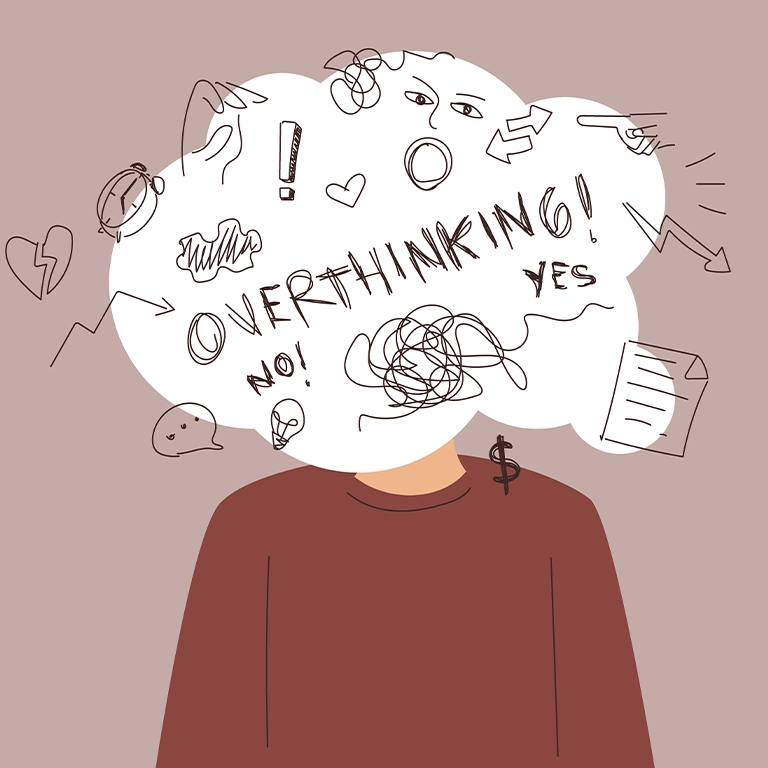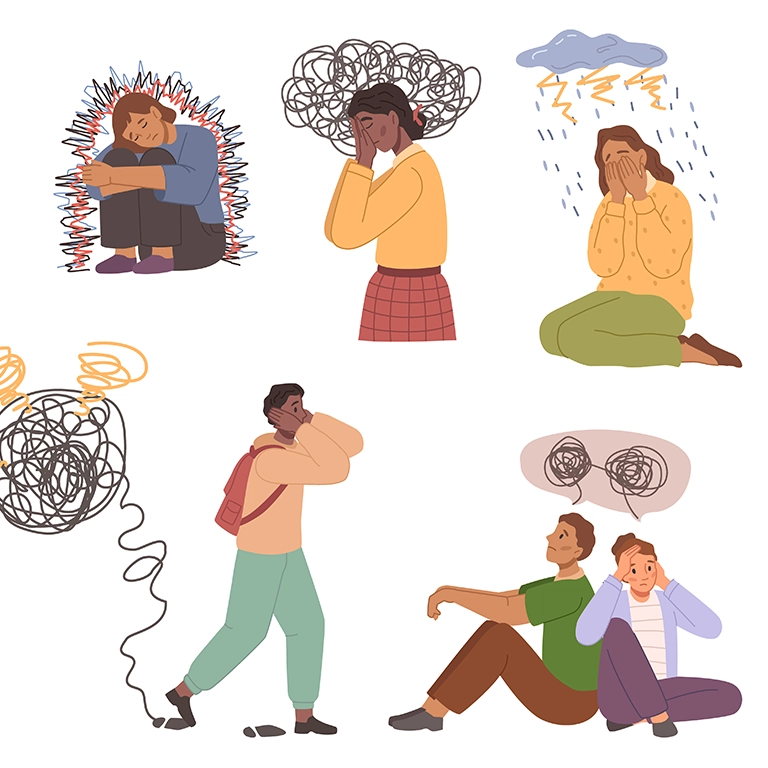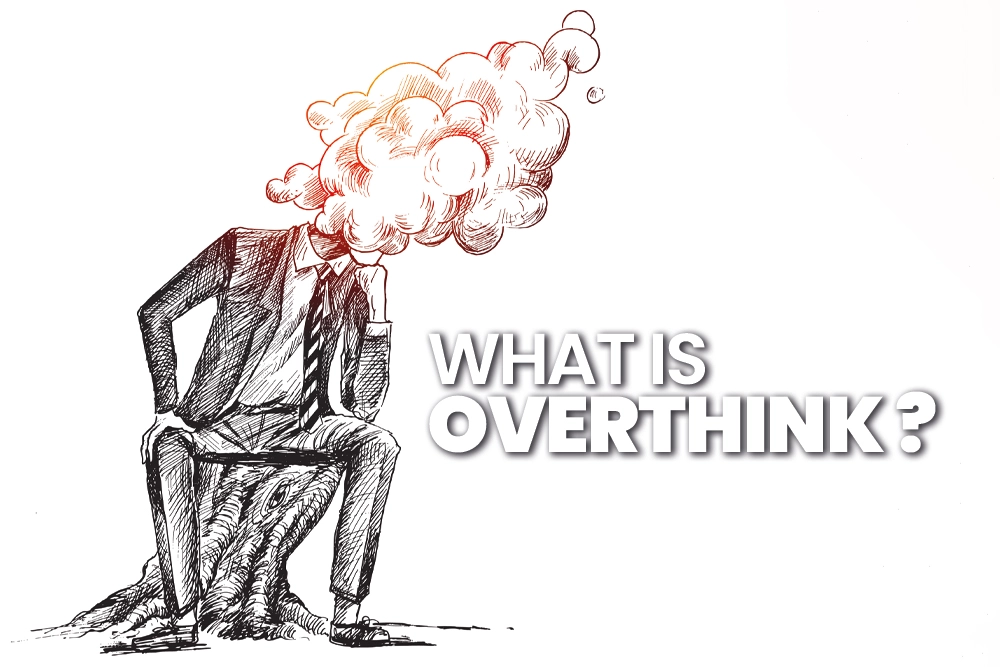What is Overthink? The meaning of overthink refers to the habit of excessively analyzing thoughts, situations or decisions, often leading to stress and anxiety. Overthinking involves getting stuck in a loop of repetitive thoughts, where individuals dwell on problems, past events or potential outcomes without reaching productive solutions. This mental pattern makes it challenging to focus on the present moment as the mind becomes consumed by worry and rumination.
Overthinking creates a sense of overwhelm, causing individuals to second guess their choices or imagine worst case scenarios. For example, an overthinker might spend hours replaying a conversation, analyzing every word to uncover hidden meanings or worrying about how others perceived them. This cycle of overthinking drains mental energy, reduces decision making confidence and leads to anxiety or low mood. Understanding the overthink definition is the first step to recognizing and addressing this common habit.
Types of Overthinking
Types of Overthinking Overthinking manifests in several distinct forms, each with unique characteristics that impact mental well being. One prevalent type is rumination, where individuals fixate on past events, such as mistakes, regrets or perceived failures. This dwelling on the past prevents moving forward and exacerbates feelings of guilt or shame.
Another form involves worrying about future situations, where overthinkers obsess over things that could go wrong or overanalyze potential outcomes. For instance, someone might endlessly debate whether to take a new job, imagining every possible scenario without deciding. Overthinking can also stem from perfectionism, where individuals strive for flawless outcomes, leading to indecision or procrastination. Recognizing these types helps overthinkers identify their patterns and take actionable steps to manage their thoughts.
Signs You’re Overthinking
Signs You’re Overthinking Identifying the signs of overthinking is crucial for breaking the cycle. Common indicators include repetitive thoughts that loop without resolution, making it feel like you can’t stop analyzing a situation. You’re an overthinker if you frequently second guess decisions, obsess over worst case scenarios or engage in all or nothing thinking, where situations are viewed in extremes.
Physical symptoms may emerge, such as difficulty sleeping, fatigue or tension headaches, as the mind remains in a state of constant stress. Overthinking tends to make individuals overly critical of themselves, leading to low self esteem or a sense of being stuck. For example, someone might spend hours worrying about a minor work mistake, convinced it will lead to catastrophic consequences, even when evidence suggests otherwise. Recognizing these signs helps individuals redirect their focus.,

What Causes Overthinking?
What Causes Overthinking? The causes of overthinking are multifaceted, often rooted in emotional, psychological or environmental triggers. Stress and anxiety are common causes as they push the brain to overanalyze situations in an attempt to gain a sense of control. For instance, someone facing a tight deadline might overthink every detail of a project, fearing failure.
Perfectionism is another significant factor as individuals who strive for flawless results may overanalyze every decision to avoid mistakes. Past traumatic or stressful events can also contribute as unresolved emotions fuel the habit of overthinking. Additionally, overthinking can be a symptom of anxiety or depression, particularly in conditions like generalized anxiety disorder, where the mind struggles to stay anchored in the present moment. Understanding these causes helps overthinkers address the root of their mental patterns.
Why Do I Overthink Everything?
Why Do I Overthink Everything? Feeling like you can’t stop overthinking often stems from a deep seated need to control outcomes or avoid failure. The cycle of overthinking begins when individuals ruminate on past mistakes or worry about future uncertainties, creating a loop of negative thoughts that’s hard to break. For example, someone might obsess over a casual comment made by a friend, wondering if it implied criticism, even when no evidence supports this fear.
This tendency is often linked to anxiety and depression, where the brain fixates on problems rather than solutions. Low self esteem or fear of judgment can also drive overthinking as individuals seek to anticipate and avoid potential criticism. Overthinking creates a mental trap, making it difficult to enjoy the present or make decisions confidently. Recognizing this pattern is key to finding ways to calm the mind and regain control.

How Do I Stop Overthinking?
How Do I Stop Overthinking? Breaking the habit of overthinking requires practical coping mechanisms and consistent effort. One effective strategy is practicing mindfulness, which involves focusing on the present moment to interrupt repetitive thoughts. For example, mindful breathing exercises can help your brain shift away from worry and rumination, grounding you in the here and now.
Another approach is setting aside designated “worry time,” where you limit overthinking to a specific period, such as 15 minutes a day. This helps you feel in control and prevents thoughts from dominating your day. Physical activity, like exercise, helps reduce stress and anxiety as it releases endorphins that promote a calmer state of mind. Working with a therapist can also provide personalized strategies, such as cognitive behavioral techniques, to overcome overthinking and build healthier thought patterns.
How to Calm Your Mind and Stop Overthinking
How to Calm Your Mind and Stop Overthinking Calming your mind involves actionable steps to disrupt the cycle of overthinking and restore mental clarity. Deep breathing exercises, such as inhaling for four seconds and exhaling for eight, can slow racing thoughts and reduce feelings of overwhelm. Meditation is another powerful tool, encouraging you to anchor yourself in the present and let go of unproductive worries.
Journaling can help you manage thoughts by externalizing them, allowing you to process emotions without ruminating. For instance, writing down worries about an upcoming presentation can help you identify actionable steps rather than dwelling on what could go wrong. Scheduling problem solving time can also prevent overanalyzing as it shifts focus to solutions. Therapy sessions with a professional can offer tailored guidance, helping you develop ways to calm your mind and focus on positive outcomes.

Is Overthinking a Mental Illness?
Is Overthinking a Mental Illness? Overthinking itself is not classified as a mental illness, but it can be a symptom of conditions like anxiety disorder or depression. When overthinking becomes chronic, it may lead to anxiety, low mood or a sense of being stuck in repetitive thought patterns, which can exacerbate mental health challenges. For example, individuals with generalized anxiety disorder often struggle with worry and rumination, making it hard to break free from overthinking.
In some cases, overthinking can contribute to a symptom of depression, such as feeling overly critical or dwelling on negative thoughts. While everyone overthinks occasionally, persistent overthinking that disrupts daily life may warrant professional support. Therapy can help clarify whether overthinking is part of a broader mental health condition and provide tools to manage it effectively.
Practical Strategies to Overcome Overthinking
Practical Strategies to Overcome Overthinking Overcoming overthinking requires a combination of mindfulness, behavioral changes and self awareness. One effective strategy is to challenge negative thoughts by asking, “Is this thought based on facts or assumptions?” This helps disrupt all or nothing thinking and encourages a more balanced perspective. For example, if you’re overthinking a work email, consider whether the recipient’s response is truly as critical as you fear.
Another approach is to engage in activities that redirect your focus, such as hobbies, exercise or socializing. These activities help your brain shift away from rumination and into the present moment. Setting realistic goals can also combat perfectionism as it encourages progress over flawless results. For persistent overthinking, therapy sessions can offer structured techniques, such as cognitive restructuring, to help you manage thoughts and feel in control.
The Impact of Overthinking on Daily Life
The Impact of Overthinking on Daily Life Overthinking can significantly disrupt daily life, affecting relationships, work and overall well being. Constant worry and rumination can lead to indecision, causing individuals to postpone important tasks or miss opportunities. For example, an overthinker might delay applying for a job due to fears of rejection, even when qualified.
Overthinking also creates physical and emotional strain, contributing to symptoms like fatigue, irritability or difficulty concentrating. It can exacerbate stress and anxiety, making it harder to enjoy positive moments or maintain healthy relationships. By recognizing how overthinking impacts daily life, individuals can take proactive steps to address it, such as practicing mindfulness or seeking professional support to break the cycle.
How Overthinking Relates to Anxiety and Depression
How Overthinking Relates to Anxiety and Depression Overthinking and anxiety are closely intertwined as excessive analysis often fuels feelings of worry and unease. For instance, someone with an anxiety disorder might overthink social interactions, fearing judgment or misinterpretation. Similarly, overthinking can be a symptom of depression, where individuals ruminate on past failures or negative thoughts, leading to a persistent low mood.
Overthinking tends to amplify these conditions, creating a feedback loop where anxiety or depression worsens the habit of overthinking and vice versa. Breaking this cycle involves addressing both the mental health condition and the overthinking pattern. Techniques like mindfulness, therapy or medication (if prescribed by a professional) can help manage these interconnected challenges, allowing individuals to regain a sense of control.
Building Long Term Habits to Prevent Overthinking
Building Long Term Habits to Prevent Overthinking Preventing overthinking requires building sustainable habits that promote mental clarity and resilience. Regular exercise helps reduce stress and anxiety as physical activity boosts endorphins and distracts the mind from repetitive thoughts. For example, a daily walk or yoga session can create a calming routine that grounds you in the present.
Establishing a consistent sleep schedule also supports mental health as fatigue can exacerbate overthinking. Practicing gratitude can shift focus from negative thoughts to positive outcomes, helping overthinkers appreciate the present moment. Over time, these habits weaken the cycle of overthinking, fostering a healthier mindset and reducing the tendency to ruminate.
The Role of Mindfulness in Managing Overthinking
The Role of Mindfulness in Managing Overthinking Mindfulness is a powerful tool for managing overthinking as it encourages individuals to focus on the present rather than dwelling on the past or worrying about the future. Techniques like mindful breathing or body scans can help overthinkers become aware of their thoughts and feelings without getting caught in a cycle of rumination.
For example, practicing a five minute mindfulness meditation daily can train the brain to let go of unproductive thoughts. Mindfulness also helps individuals recognize when overthinking starts, allowing them to redirect their focus before it spirals. Incorporating mindfulness into daily routines, such as during meals or while walking, can create a natural looking way to stay grounded and reduce the habit of overthinking.
Seeking Professional Help for Overthinking
Seeking Professional Help for Overthinking For those who find overthinking overwhelming, working with a therapist can provide significant relief. Therapy sessions offer a safe space to explore the causes of overthinking, such as underlying anxiety or depression, and develop tailored coping mechanisms. Cognitive behavioral therapy (CBT) is particularly effective as it helps individuals identify and challenge negative thought patterns.
Therapists can also teach techniques to manage thoughts, such as reframing worst case scenarios or practicing structured problem solving. For individuals with persistent overthinking, professional support can help uncover whether it’s a symptom of a broader condition like generalized anxiety disorder and provide strategies to feel in control. Seeking help is a proactive step toward breaking the cycle of overthinking.
Frequently Asked Questions
What Exactly is Overthinking?
What Exactly is Overthinking? The overthink definition describes a pattern of excessively dwelling on thoughts, often leading to worry and rumination. It involves overanalyzing situations, decisions or events, which hinders problem solving and creates unnecessary stress. For example, an overthinker might obsess over a minor mistake, imagining it will lead to significant consequences.
What is the Cause of Overthinking?
What is the Cause of Overthinking? Common causes of overthinking include stress, perfectionism and underlying anxiety or depression. Past traumatic events or low self esteem can also drive individuals to ruminate on past mistakes or worry about things that could go wrong, trapping them in a cycle of negative thoughts.
What is the Meaning of Overthink?
What is the Meaning of Overthink? The meaning of overthink refers to overanalyzing or dwelling on thoughts beyond what is productive. This habit often involves imagining worst case scenarios, being overly critical or struggling with indecision, which can lead to anxiety and prevent effective decision making.
What Are the Symptoms of Overthinking?
What Are the Symptoms of Overthinking? Symptoms of overthinking include repetitive thoughts, difficulty making decisions and feeling anxious or overwhelmed. Physical signs, such as insomnia, fatigue or tension, may also appear, signaling that overthinking is impacting both mental and physical health.
What Will Happen if We Overthink?
What Will Happen if We Overthink? Overthinking can lead to increased stress and anxiety, reduced confidence in decision making and a sense of being stuck in unproductive thought patterns. It may also contribute to low mood or exacerbate conditions like generalized anxiety disorder, affecting overall well being.
What Can Overthinking Do to You?
What Can Overthinking Do to You? Overthinking creates mental exhaustion, lowers self esteem and can delay important actions due to fear of failure. It may lead to anxiety or depression, making it harder to focus on positive outcomes or enjoy the present moment, ultimately impacting relationships and productivity.
What Does Overthinking Lead To?
What Does Overthinking Lead To? Overthinking often leads to heightened anxiety, indecision and a cycle of unproductive thoughts that hinder progress. It can also contribute to physical symptoms like fatigue and may worsen mental health conditions, making it essential to address through mindfulness or professional support.
Follow us on Social Media
internationalplusofficial
internationalplus
internationalplusdental
This content is written, reviewed, and approved by the International Plus Medical Review Board to ensure clinical accuracy and adherence to strict editorial standards. All medical information is regularly monitored, audited and updated in light of the latest scientific advancements.
However the information provided here is for general informational purposes only and cannot be used for self diagnosis or making individual health interpretations. Results of medical treatments depend on individual anatomy and the unique healing process of each patient. This information should not replace a personal consultation with a qualified healthcare professional.
To understand the best options for your specific needs and to receive a personalized treatment plan, we invite you to book a free consultation with the expert medical team at International Plus.
Medical Review BoardInternational Plus was established from scratch in 2014 with the sole purpose of providing a world class center for plastic and cosmetic surgery by SAMİLSAN SAĞLIK HİZMETLERİ TURİZM DANIŞMANLIK TİCARET LİMİTED ŞİRKETİ International Plus has developed a worldwide reputation for its unique treatments and techniques. With over 10 years of experience, our talented medical experts are among the best in their respective fields. You are our priority. We are convinced that good communication between you and your surgeon is essential when planning your treatments. We offer realistic advice and the most suitable treatments for you.




